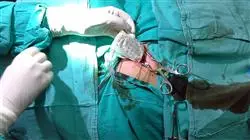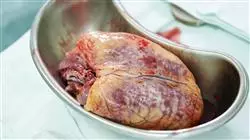University certificate
The world's largest faculty of medicine”
Why study at TECH?
Improve your knowledge in Oncological Cardiology through this course, where you will find the best didactic material with real case studies"

Cardiac toxicity (CT) occurs in 30% of the millions of patients treated today for oncological processes. This is a "serious complication that usually debuts as heart failure and negatively affects the prognosis" of patients. The onset and severity of CT related to oncologic treatment are varied, depending mainly on each patient's individual susceptibility, the mechanism of action of the therapy, the capacity for early detection and the establishment of targeted treatment.
The objective of this course is to offer updated training in an area of current relevance from the clinical point of view, whose knowledge is advancing rapidly, focused on the specialization of the professionals involved interested in the subject.
Cardiologists, oncologists and hematologists with special interest in this field have with this course the opportunity to complete and update their knowledge in oncologic cardiology. The final objective of this training will be that students learn the pathophysiological basis of the genesis of CT, as well as the ways to detect and treat it. Students will get to know, understand and apply the latest diagnostic techniques, and preventive and therapeutic measures specific to CT in oncology patients.
Emphasis will be placed on solving complex clinical problems by performing case studies based on real-life situations. In addition, it offers a unique opportunity to learn about the latest research advances in this high-demand field.
Learn about the latest advances in the specialty to be able to perform a quality medical practice"
This Postgraduate certificate in Myocardial and Coronary Injury due to Cardiotoxicity in the Oncologic Patient offers you the characteristics of a high level scientific, teaching and technological course. These are some of its most notable features:
- Latest technology in online teaching software
- Highly visual teaching system, supported by graphic and schematic contents that are easy to assimilate and understand
- Practical cases presented by practising experts
State-of-the-art interactive video systems - Teaching supported by telepractice
- Continuous updating and recycling systems
- Self-regulating learning: full compatibility with other occupations
- Practical exercises for self-evaluation and learning verification
- Support groups and educational synergies: questions to the expert, debate and knowledge forums
- Communication with the teacher and individual reflection work
- Content that is accessible from any fixed or portable device with an Internet connection
- Banks of complementary documentation permanently available, even after the course
This course may be the best investment you can make in the selection of a refresher program for two reasons: besides updating your knowledge in Myocardial and Coronary Injury due to Cardiotoxicity in the Oncologic Patient, you will obtain a course certificate from TECH Global University"
Our teaching team is composed of professionals belonging to the field of Oncological Cardiology. In this way, we make sure to provide you with the training update that we intend. A multidisciplinary team of doctors trained and experienced in different fields, who will develop the theoretical knowledge in an efficient way, but, above all, will put at the service of the Course the practical knowledge derived from their own experience: one of the differential qualities of this Course.
This mastery of the subject is complemented by the effectiveness of the methodological design of this course. Developed by a multidisciplinary team of e-learning experts, it integrates the latest advances in educational technology. Thus, you will be able to study with a series of comfortable and versatile multimedia tools that will give you the operability you need in your training.
The design of this program is based on Problem Based Learning: an approach that conceives learning as an eminently practical process. To achieve this at a distance, we will use telepractice: with the help of an innovative interactive video system, and learning from an expert, you will be able to acquire the knowledge as if you were facing the scenario you are learning at that moment. A concept that will allow you to integrate and fix the learning in a more realistic and permanent way.
It includes clinical cases that bring the development of the program as close as possible to the reality of medical care"

You will have professionals in the sector to guide you throughout the training process"
Syllabus
The structure of the contents has been designed by a team of professionals from the best hospitals and universities in the country, who are aware of the relevance of up-to-date training to be able to intervene in the diagnosis and treatment of heart problems in oncology patients through the use of Cardio-Oncology, and are committed to quality teaching through new educational technologies.

Train with renowned professionals, who will provide you with their knowledge and experience in Cardio-Oncology"
Module 1. Myocardial Toxicity
1.1. Incidence and Clinical Relevance
1.2. Pathophysiology of Ventricular Dysfunction and Heart Failure in the Context of Cardiotoxicity
1.3. Drugs Implicated in the Development of Ventricular Dysfunction and Heart Failure
1.3.1. Anthracyclines
1.3.2. Other Chemotherapy Drugs
1.3.3. Biological Agents: Monoclonal Antibodies
1.3.4. Therapies Directed Against New Molecular Targets: Inhibitors of Cellular Kinases
1.3.5. Proteosome Inhibitors
1.4. Radiotherapy and Heart Failure
1.5. Diagnostic Methods of Myocardial Involvement
1.5.1. Electrocardiogram
1.5.2. Echocardiography
1.5.3. Other Noninvasive Imaging Techniques
1.6. Treatment Strategies
1.6.1. Treatment of Acute Heart Failure
1.6.2. Tratamiento crónico de pacientes con disfunción ventricular
1.7. Presymptomatic Myocardial Involvement
1.7.1. Management of the Patient with Elevated Circulating Biomarkers during Oncology Treatment
1.7.2. Approach to the Patient with Preclinical Alteration of Ventricular Function during Oncologic Treatment
1.8. Follow-up Strategy during Treatment with Drugs with the Capacity to Produce Myocardial Toxicity
1.8.1. Anthracyclines
1.8.2. Biological Agents: Monoclonal Antibodies
1.8.3. Therapies Directed Against New Molecular Targets: Inhibitors of Cellular Kinases
1.8.4. Immune Checkpoint Inhibitors
Module 2. Ischemic Heart Disease and Cardiotoxicity
2.1. Incidence of Ischemic Heart Disease in Oncology Patients
2.2. Identification of Patients at High Risk for Coronary Heart Disease
2.3. Pathophysiology of Ischemic Heart Disease in the Context of Oncology Treatment
2.4. Pharmacologic Oncologic Therapies that Favor Ischemic Heart Disease
2.4.1. Fluoropyrimidine
2.4.2. Vascular Endothelial Growth Factor Inhibitors
2.4.3. Other (cis-platinum)
2.5. Diagnostic Methods of Coronary Heart Disease Related to Cardiotoxic Drugs
2.5.1. Electrocardiogram
2.5.2. Functional Tests
2.5.3. Non-invasive Imaging Tests
2.5.4. Pruebas de imagen invasiva
2.6. Acute Coronary Syndrome in the Context of Oncologic Treatment
2.7. Follow-up and Treatment Strategy in Patients with Coronary Ischemia
2.8. Thoracic Radiotherapy and Ischemic Heart Disease
2.8.1. Incidence and Pathophysiology of Radioinduced Coronary Artery Disease
2.8.2. Risk Factors for the Development of Ischemic Heart Disease in the Patient Who Has Received Radiation Therapy
2.8.3. Clinical Assessment and Diagnostic Methods of Coronary Heart Disease in the Patient Who Has Received Radiation Therapy
2.8.4. Therapeutic Options in Coronary Heart Disease Associated with Radiotherapy
2.9. Management of the Chronic Ischemic Patient Receiving Oncologic Treatment

A unique, key, and decisive training experience to boost your professional development”
Postgraduate Certificate in Myocardial and Coronary Injury due to Cardiotoxicity in the Oncologic Patient
In the modern era, advances in medicine have led to improved cancer treatments and increased survival of cancer patients. However, the use of antineoplastic therapies can lead to side effects on the cardiovascular system, such as cardiotoxicity. It is for this reason that we have developed the Postgraduate Certificate in Myocardial and Coronary Injury due to Cardiotoxicity in the Oncologic Patient, a program designed to train health professionals in this specialized and constantly growing field. With the increased survival of oncology patients, there is a need for specialists capable of identifying and managing cardiovascular complications associated with cancer treatments. The Postgraduate Certificate in Myocardial and Coronary Injury due to Cardiotoxicity in the Oncologic Patient from TECH Global University gives you the opportunity to acquire the knowledge and skills necessary to excel in this specialized field and provide quality care to patients.
What will be your field of action in the job market?
Our program focuses on the latest advances and discoveries in the field of oncologic cardiotoxicity. You will learn about the different types of antineoplastic therapies and their impact on the cardiovascular system, as well as strategies for prevention, diagnosis and treatment of cardiotoxicity. Upon completion of the Postgraduate Certificate in Myocardial and Coronary Injury due to Cardiotoxicity in the Oncologic Patient from TECH Global University, you will be prepared to face the challenges and job opportunities in this specialized field. You will be able to work in oncology centers, hospitals, clinics and offices, collaborating in the comprehensive care of cancer patients and providing specific and quality cardiovascular care. Don't miss the opportunity to make a difference in the field of oncologic cardiotoxicity. Join TECH Global University's Postgraduate Certificate in Myocardial and Coronary Injury due to Cardiotoxicity in the Oncologic Patient and expand your knowledge, develop new skills and build a rewarding career in the healthcare field.







